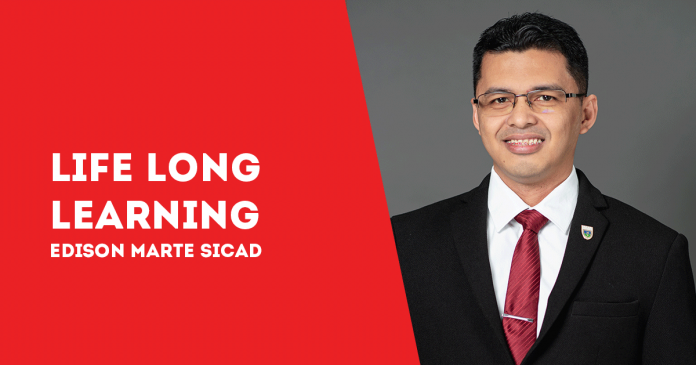
BY EDISON MARTE SICAD
“The capacity to learn is a gift; The ability to learn is a skill; The willingness to learn is a choice.” —Brian Herbert
“I HATE school.”
I would often hear this from students. I would then remind myself that they really don’t know what they are talking about, that such a remark is only an expression of exasperation. They have things to study, and they don’t know how or where to start.
Their disdain towards learning is an internal struggle between the uncertainty of the process of education and the expectation of leniency from classroom activities.
I remind myself that they are only asking for help; that what the students are really asking for is guidance, not tolerance. What the students need is toughness in facing difficult and uncomfortable situations, not affection that leads to weakness.
But what if it is the teacher who would complain?
A sad reality: a student who hates learning with a teacher who hates teaching.
Of course, no one, as far as I know, enjoys going to work every single day. There will always be a bad hair day. But hopefully, we will not experience being the wrong person at the wrong place and at the wrong time.
If a person wishes to be somewhere else or is hoping that what is happening should not be happening, there are ways out of it: learn from the experience; see the bigger perspective; and be proactive.
Toughness (strength of character) is the only means of survival: toughness of the heart, the mind, and the body. Negative or destructive feelings must be felt. Difficulty in solving problems in life and in work must be encountered. Bodily pain must be suffered.
To live is to struggle. It is not happiness and comfort that give meaning to achievements. It is the significance beyond fame and admiration.
Students will eventually realize this. We will all hopefully realize this. For we are all students of life. And holistic learning is the key in appreciating lived experiences. But we have to be careful of the following obstacles:
1. Distractions
Be it in thought or action, distractions can be in the form of wasting time scrolling or wasting time worrying. People nowadays spend their day as full-time distraction with intermittent studying or working time. Surprisingly, distraction has another name: leisure time or time for self. And we can always justify the appropriateness of our activities.
2. Doubts
As the saying goes, “If you don’t believe you can do it, then you will never have the time and energy required to do it.” Our mind can be destructively logical. A person’s brain is set in the default mode of comfort. We will most likely seek for what is familiar, convenient, and easy.
3. Failures
A child may hate success not because of the failure that it can bring but because of the required effort behind it.
On the other hand, some students will throw or hide a paper with failing marks. They will lie and cheat to avoid getting a low score. And some of them do this out of fear from their parents. Parents would readily scold their children when they make mistakes and commit failures. Parents must understand that raising children is not all about raising voices.
IN CONCLUSION, the declaration “I hate —.” is, in itself, a process. It is part of the learning curve. But how does authentic learning happen?
It begins with honest reflection: one of the most difficult evaluations there is. For we can be biased, and even lie to our own self. Hopefully, we will realize that most of the things we hate doing are the ones that can really help us: waking up early, consistent exercise and diet, rigorous study, professionalism, and integrity of actions./PN




